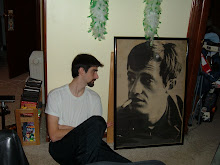Much of being a graduate student is being told how to focus on what you want to study with extreme zeal over in the months to follow. What happens is you are told constantly to research, research, research. Once you've done that write something and be told that you need to do more research. After doing this in repetition for three months words begin to pile up like traffic on the Jersey turnpike and there comes a point where you just don't know what to do next. Call it writers block or academic anemia, what happens next is the equivalent of laying on the horn in deadlock traffic.
Part of my deadlock this semester led me to go back to what I know best. And that is the horror film. The title to this post reflects a paper that I wrote on George Romero and his three zombie films of the past century. I don't want to write so much on that but rather blog in an epilogues way.
When I think about the three films that I wrote about (Night, Dawn and Day of the Dead) I tried to tie them into this idea of post-modernism and patriarchal society. Besides that academic stuff I saw in the films the effort of a filmmaker who really wanted to say something using a genre that is looked down upon. I know very well that horror films can be very polarizing and down right disturbing. They touch upon a part of us that really challenges our fears. And allot of us don't want to address fear. I can't pinpoint exactly the fears that Romero addresses in his films but there are some indicators that come up.
The premise of the zombie films are basically that zombies have run through the american society. The films focus on the failings of the military, government, middle-class life, upper-class life, consumer society, familial relations, and much more. The films express the end of the world, maybe not the apocalypse that ends earth, but life as we are familiar with. This is what makes us uncomfortable. When we look at the world we live in it is possible that we expect that tomorrow things will be the same as they were today. Things will be the same, next year, next five years, next ten years. What if it's not?
The films show that most likely we'll continue to live as though change was never happening. Call it denial, or just the plain failure of our set up of cultural capital. I know it is hard to let go of the things that we are used to. Why? Because we are comfortable with how things are. What Romero's zombie films shows is that the reluctance to change leads to a consuming death. (More often than not, that is shown physically). Rather than wait for this world to end, I'll leave it a stranger, and avoid the zombies on the turnpike.

